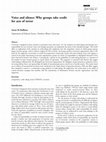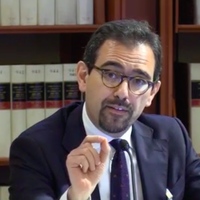Papers by Aaron M Hoffman
Limiting the attention countries receive from the foreign press is thought to reduce the incidenc... more Limiting the attention countries receive from the foreign press is thought to reduce the incidence of deadly foreign attacks, but by how much? We show that the incidence of deadly foreign terrorism increases as a nonlinear function of the level of foreign press attention states receive. As a result, the benefits of reducing foreign press attention to prevent deadly foreign terrorist attacks are uneven: Some states stand to benefit more than others. Nevertheless, we also show that reducing press attention produces, at best, only minor reductions in the number of deadly foreign terrorist attacks states experience. These results suggest that reducing foreign press attention may not provide as much security as governments expect.
Supplemental Material, self_report_analysis_repeat_exposure_study_3_July_2017 for Comfortably Num... more Supplemental Material, self_report_analysis_repeat_exposure_study_3_July_2017 for Comfortably Numb: Effects of Prolonged Media Coverage by Aaron M. Hoffman and José Kaire in Journal of Conflict Resolution
Supplemental material, Appendix_11_15_2019 for Does bottom-line pressure make terrorism coverage ... more Supplemental material, Appendix_11_15_2019 for Does bottom-line pressure make terrorism coverage more negative? Evidence from a twenty-newspaper panel study by Aaron M Hoffman and Dwaine HA Jengelley in Media, War & Conflict
International Interactions, 2018
ABSTRACT Limiting the attention countries receive from the foreign press is thought to reduce the... more ABSTRACT Limiting the attention countries receive from the foreign press is thought to reduce the incidence of deadly foreign attacks, but by how much? We show that the incidence of deadly foreign terrorism increases as a nonlinear function of the level of foreign press attention states receive. As a result, the benefits of reducing foreign press attention to prevent deadly foreign terrorist attacks are uneven: some states stand to benefit more than others. Nevertheless, we also show that reducing press attention produces, at best, only minor reductions in the number of deadly foreign terrorist attacks states experience. These results suggest that reducing foreign press attention may not provide as much security as governments expect.

Journal of Conflict Resolution, 2020
Exposure to a single report about terrorism in the mass media can trigger a range of emotional an... more Exposure to a single report about terrorism in the mass media can trigger a range of emotional and political reactions. The consequences of exposure to several terrorism reports in row, however, are a matter of controversy. We examine the effects of prolonged terrorism coverage using an experimental design that combines self-report measures of emotions and political attitudes with instantaneous biometric data on emotions. Consistent with research on nonassociational learning, we find that exposure to multiple videos habituates people to depictions of terrorism: the longer people watch terrorism coverage, the less intense their reactions are to the images of terrorism they see. Some images and videos, however, contribute to this result more than others. This suggests that the ultimate effects of terrorism coverage depend on the interplay between the quantity and quality of reporting, not the quantity alone.
Media, War & Conflict, 2020
Existing research suggests that journalists who work at newspapers that emphasize profitability i... more Existing research suggests that journalists who work at newspapers that emphasize profitability increase the negativity of their terrorism reporting in response to declining revenues. Many journalists, however, dispute the connection between the sale of news and the coverage of news. The authors address this debate using an original panel dataset of articles about terrorism between 1997 and 2014, published by 20 of the top circulating newspapers in the United States. The results show that the negativity of coverage is influenced by the profit orientations of newspaper owners rather than the success that news organizations have in selling the news. The deadliness of terrorist attacks, the post-9/11 media environment, and public distrust of the news media also influence the tone of terrorism coverage.
Political Science Quarterly, 2007

Personality and Social Psychology Bulletin, 2007
Applying constructs from the investment model used traditionally to understand interpersonal comm... more Applying constructs from the investment model used traditionally to understand interpersonal commitment, the present investigation seeks to elucidate social cognitive antecedents of commitment to the war on terror waged by the United States. In Study 1, satisfaction with, investments in, and alternatives to the war on terror predict levels of commitment to the war beyond several important control variables. In Study 2, levels of satisfaction with, investments in, and alternatives to the war are experimentally manipulated. The highest levels of commitment to the war are observed among participants exposed to a high satisfaction, high investment, and low alternatives scenario, and the lowest levels are among those exposed to a low satisfaction, low investment, and high alternatives scenario. These results support broadening the targets of commitment normally considered within the context of the investment model and suggest applying relational models to understanding broader societal c...
Journal of Conflict Resolution, 2013
Using experiments, we show that subjects who are asked about their support for war without being ... more Using experiments, we show that subjects who are asked about their support for war without being told about diplomatic strategies to deal with crises back military operations at levels consistent with people who are told that the alternatives to war are of low quality. In contrast, subjects who are told that diplomacy could work to resolve conflicts express less support for military operations. These results suggest that, in the absence of conflicting evidence, people premise their support for war on the assumption that leaders use force as a last resort. Implications for the study of success as an influence on public attitudes about US military operations are considered.
International Interactions, 2009
This article may be used for research, teaching and private study purposes. Any substantial or sy... more This article may be used for research, teaching and private study purposes. Any substantial or systematic reproduction, re-distribution, re-selling, loan or sub-licensing, systematic supply or distribution in any form to anyone is expressly forbidden. The publisher does not give any warranty express or implied or make any representation that the contents will be complete or accurate or up to date. The accuracy of any instructions, formulae and drug doses should be independently verified with primary sources. The publisher shall not be liable for any loss, actions, claims, proceedings, demand or costs or damages whatsoever or howsoever caused arising directly or indirectly in connection with or arising out of the use of this material.

European Journal of International Relations, 2002
This article provides a conceptualization of trust in interstate relations in terms amenable to r... more This article provides a conceptualization of trust in interstate relations in terms amenable to research. In the field of International Relations trust is often equated with the willingness to take risks on the behavior of others. However, this approach is problematic because it does not provide a basis for distinguishing between trusting and non-trusting relationships. In contrast, I propose that trust implies a willingness to take risks on the behavior of others based on the belief that potential trustees will `do what is right'. Recognizing that trust involves particular beliefs about the motivations of others distinguishes it from the broader category of risk and enables trusting relationships to be identified more precisely. After elaborating my definitional approach, I discuss indicators designed to gauge the presence of trusting interstate relations in empirical settings.

Journal of Peace Research, 2010
Terrorism is designed to draw attention to particular issues and causes. Yet, the incidence of cr... more Terrorism is designed to draw attention to particular issues and causes. Yet, the incidence of credit-taking (announcing one’s responsibility for acts of terror) varies even though anonymity can undermine the clarity of the intended messages. This article offers an explanation of the variation in credit-taking that emphasizes how the competitive context in which groups operate shapes terrorists groups’ need to cultivate support for their activities. Increasing numbers of terrorist organizations make it difficult for the supporters of terrorism to reward the perpetrators of particular attacks with their backing. Since such support is critical to the proper functioning of terrorist organizations, groups use claims of responsibility to distinguish themselves from those that had no hand in the violence. Consequently, variation in the probability of credit-taking fluctuates as a function of the number of active terrorist groups in a given theater of operations. This argument is contraste...

It will come as no surprise to academics that news coverage of the 2013 Boston Marathon bombing f... more It will come as no surprise to academics that news coverage of the 2013 Boston Marathon bombing focused on the chaos of that day and featured gruesome pictures of people with their legs blown off. If it bleeds it leads, after all. Just three days later, however, coverage shifted to President Obama's effort to comfort Bostonians at an interfaith service and to images of the suspects uncovered by investigators. Was this later coverage an aberration or does the media try to reassure the public during crises more perhaps than previously recognized? Using content analytic techniques, I examine this question by studying the emotional valence of articles on the Marathon bombing published in the Boston Globe from 16-21 April 2013. Consistent with work on “hot crises,” this research suggests that the news media balances its negative coverage with positive sentiments to reassure people about their safety. Although reporters may be unsuccessful their efforts, they do not appear to supply people a steady stream of alarming information at all times. On the contrary, the press may provide an unexpected source of emotional support during periods of heightened anxiety.
Using an experimental approach, we show that subjects who are asked about their support for war w... more Using an experimental approach, we show that subjects who are asked about their support for war without being told about diplomatic strategies to deal with crises back military operations at levels consistent with people who are told that the alternatives to war are of low quality. In contrast, subjects who are told that diplomacy could work to resolve conflicts express less support for military operations. These results suggest that, in the absence of conflicting evidence, people premise their support for war on the assumption that leaders resort to force as a last resort. Implications for the study of success as an influence on public attitudes about U.S. military operations are considered.
Publicity is central to terrorism, but demonstrating a link between press freedom and the targeti... more Publicity is central to terrorism, but demonstrating a link between press freedom and the targeting of attacks is challenging. There are several reasons for this: 1) studies do not distinguish between press freedom and press attention; 2) perpetrators use press freedom to weed out unacceptable targets rather than to determine which targets to attack; 3) only foreign, not domestic, perpetrators depend on press attention; and 4) foreign terrorists satisfy their desire for press attention by attacking powerful states. Our models confirm this argument about press freedom and national power even after controlling for executive constraints, polity, and foreign policy activity.
Drafts by Aaron M Hoffman

We investigate how effective counterterrorism influences (1) confidence in government efforts to ... more We investigate how effective counterterrorism influences (1) confidence in government efforts to deal with terrorism and (2) anxiety about future attacks. Research on " heuristic judgments " implies information about counterterrorism undercuts people's sense of security from terrorism. Across three experiments, however, we find that people who are exposed to information about effective counterterrorism express more confidence in the ability of governments to either protect citizens from future attacks or prevent future violence than those who did not receive these treatments. People who receive information about effective counterterrorism also show greater willingness to approach sources of danger than those who do not get this information. Finally, exposure to counterterrorism information did not increase people's anxiety about attacks. On the contrary, in one study information about effective counterterrorism erased the effects of exposure to information about terrorism. Communications about successful counterterrorism do not necessarily undermine government efforts to reassure people about their security.











Uploads
Papers by Aaron M Hoffman
Drafts by Aaron M Hoffman